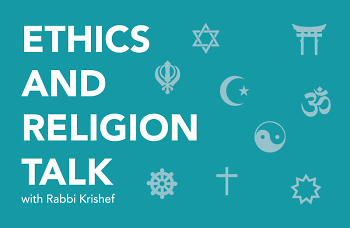Father Kevin Niehoff, O.P., a Dominican priest who serves as Adjutant Judicial Vicar, Diocese of Grand Rapids, responds:
“There is no reason for religion and science to be in opposition. When I lived in Rome, Italy, I would give tours of Saint Peter’s Square, and I would point out all the science that is present in the square itself. For example, there are four rows of columns in the colonnade that visually become one row when one stands in a specific spot demarked by a marble slab.
“For this humble human being, the age of the earth is not something I consider important or even worth discussing. What is most important about creation is not when it occurred or the process… what is important is that God is the source of created being.”
Fred Stella, the Pracharak (Outreach Minister) for the West Michigan Hindu Temple, responds:
“Hinduism approaches creation (more appropriate is ‘manifestation’) with both mythology and science. But the myths that are told are meant to provide meaning, not archeology or anthropology.
“As far as the earth’s age, the Vedas would strongly indicate that our planet is between 9,000,000,000 -10,000,000,000 years old. This opposes the current science, which claims an age closer to 14,000,000,000. So, I guess we have our ‘young earthers’ too, though I have never heard of people quibbling about few billion years.
“It’s not that Hindus never have debates with scientists. We are blessed with the epic stories, The Ramayana and The Mahabharata. They are said to be an amalgamation of history, theology, mythology and analogy. While some attempt to untie the Gordian knot of all these elements, many teachers encourage us to simply enjoy the story and seek to improve ourselves through the morality expressed within it. That said, it is interesting that some portions of these tales that were once considered myth are now being revisited by archeologists and anthropologists. Some of the findings have indicated evidence that there may be more history involved than previously thought.”
Rev. Ray Lanning, a retired minister of the Reformed Presbyterian Church of North America, responds:
“Presbyterianism teaches that, ‘The work of creation is God’s making all things of nothing, by the word of His power, in the space of six days, and all very good’ (Shorter Catechism, Q. 9). The ‘all things’ are all things in the visible heavens and earth that we inhabit, that is, the ‘biosphere.’ We know very little about the creation of angels and the dominions and principalities they inhabit. Nor does Scripture tell us anything about the process by which all things in the biosphere sprang into being at God’s command.
“The Reformed Confessions and Catechisms are silent on the age of our planet. English versions of the Bible used to be printed with a system of dating devised in the 17th century, which assigned the date of 4004 BC to the creation accounts in Genesis. This system of dating had no divine authority, and has vanished from our Bibles today. There is no authoritative answer to the question.
“Religion conflicts with science when the findings of science are given religious authority. Critics of religion often speak of ‘the assured results of modern science.’ The results or findings of scientific investigation are never assured or fixed, but always tentative and subject to revision. Scientists work with a self-imposed limitation of vision and knowledge, confining themselves only to what can be observed, measured, and tested. God is a Spirit, invisible, infinite, eternal, and unchanging. Science can tell us nothing about such a Being and the works only He can perform.”
Linda Knieriemen, Senior Pastor at First Presbyterian Church in Holland, responds:
“God created us with intellect and curiosity. Using brains and inquiry scientists, particular over the past 200 years, using the scientific method, have advanced theories of earth’s age using findings of archeology, geology, chemistry and physics. Their findings are convincing: the earth is about 4 1/2 billion years old. Parts of the solar system even older.
“The creation stories in Genesis are not science. They are story, a written record of that tells about God’s interaction with humanity. I believe God is quite happy to have us read about God’s desire for and love for a world in Genesis and about the dinosaurs and ancient trilobites in Scientific American.”
The Reverend Colleen Squires, minister at All Souls Community Church of West Michigan, a Unitarian Universalist Congregation, responds:
“Almost all Unitarian Universalists believe in the scientific understanding of creation. We believe the Earth is over 4 billion years old and our beliefs are compatible with science.”
My response:
Traditional Judaism believes that the earth, as of the third week in September, is 5781 years old. Many Orthodox Jews and other traditional and more liberal Jewish denominations understand that number to be a non-historical convention for dating Biblical stories, not a scientific claim.
This column answers questions of Ethics and Religion by submitting them to a multi-faith panel of spiritual leaders in the Grand Rapids area. We’d love to hear about the ordinary ethical questions that come up in the course of your day as well as any questions of religion that you’ve wondered about. Tell us how you resolved an ethical dilemma and see how members of the Ethics and Religion Talk panel would have handled the same situation. Please send your questions to [email protected].
The Rapidian, a program of the 501(c)3 nonprofit Community Media Center, relies on the community’s support to help cover the cost of training reporters and publishing content.
We need your help.
If each of our readers and content creators who values this community platform help support its creation and maintenance, The Rapidian can continue to educate and facilitate a conversation around issues for years to come.
Please support The Rapidian and make a contribution today.
